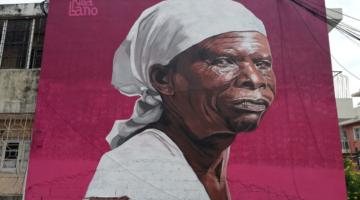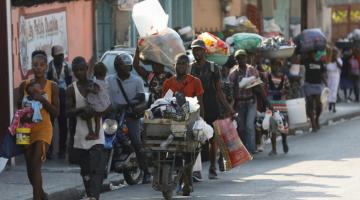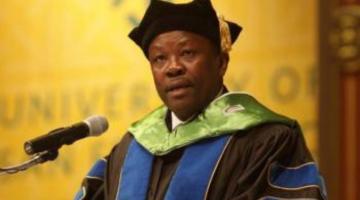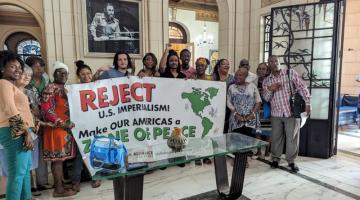The US puppets that run Haiti have squandered an historic opportunity for economic and social development.
“The country’s energy security is in serious danger.”
The PetroCaribe Energy Agreement, as envisioned in 2005, was more than a program to promote business in the oil sector among Caribbean countries. At its heart, the agreement, while offering affordable prices on oil products at fair rates, was focused on promoting socio-economic development to eliminate inequality and improve the quality of life in the partner countries.
In that sense, the embezzlement of 3.8 million dollars of PetroCaribe Funds by Haitian government officials has first and foremost been a disservice to the people of Haiti. Furthermore the Haitian government’s hostile attitude towards Venezuela, in alignment with US interests, has damaged an already fractured relationship.
In the concluding part of the two-part series, Haitian activist and economist Jean Jores Pierre discusses Haiti’s missed opportunities and miscalculations with regards to the PetroCaribe Energy Agreement.
Haiti’s lost opportunities
The leaders and governments that signed the PetroCaribe Energy Agreement in 2005 declared that PetroCaribe should contribute to the transformation of Latin American and Caribbean societies so that they are more just, educated, participatory and practice solidarity. PetroCaribe was thus conceived as a comprehensive process that promotes the elimination of social inequalities, improves the quality of life and helps people take their destiny into their hands.
The member states of the agreement agreed to work on the following specific objectives: stimulate local production through the exchange of goods and services for hydrocarbons; ensure savings and promote renewable energy; increase the capacities of electrically produced refinement, petrochemicals, storage and distribution of hydrocarbons; reinforce the security and sovereignty of the nations in the region and take on great social and productive projects; carry out exchanges of knowledge, transfers of technology by creating mixed binational or transnational companies; allow for the management of energy thanks to financial agreements to increase the availability of resources, as Bolivia and Nicaragua have done. This possibility had been offered to the Haitian governments, but they did not take advantage to improve, for example, national agricultural production.
“PetroCaribe was conceived as a comprehensive process.”
As such, the PetroCaribe funds were an opportunity to invest in the national production and strengthen national currency sovereignty. More than 60% of the food products consumed by the population are imported from the Dominican Republic and the USA. This situation further increases the deficit of our commercial budget and accelerates the depreciation of the gourde compared to the dollar. The 76.8 million dollars of PetroCaribe Funds assigned to the agricultural sector did not serve to improve the productivity of Haitian peasants. These funds have disappeared in the same way that the other funds assigned to around 300 projects financed by the ALBA-CARIBE funds.
Those that take public decisions in Haiti have chosen to not invest in national production in the way outlined by the PetroCaribe Agreement. On several occasions, million dollar contracts have been handed over to Dominican companies. Haitian companies were not even prioritized. The infrastructure and other projects financed by the PetroCaribe funds have largely been inconclusive, while the Haitian state has for the most part already spent these funds.
The public debt of Haiti in 2019 reached 3.689 billion USD of which, the external debt is 2.147 billion USD. The two largest creditors are Venezuela and the Bank of the Republic of Haiti (BRH) with debts of 1.8 billion USD and 960 million USD respectively.
“Haitian companies were not even prioritized.”
Currently, the population of Haiti faces the accelerated depreciation of the gourde, with around 120 gourdes equal to 1 USD. The national currency suffers the consequences of the failures of Haitian leaders. The monetary policy of the Central Bank (BRH) consists in injecting millions of US dollars into the economy through the financial system, without creating mechanisms of direct financing in the real economy. These injected funds in the financial system were captured in some weeks by private banks and the capitalist class of the country.
Between 2008 and 2017, this Agreement gave the Haitian state annual financing of around 300 million USD. The Haitian State had never received so much cash. The ridiculous amounts of classic international aid of the IMF (International Monetary Fund), of the World Bank, and other international organisms are insignificant in relation to the cushion of liquidity generated by the PetroCaribe funds.
During these 10 years, the country has benefited from more than 4.2 billion dollars of energy products. This permitted the Haitian state to maintain a relatively stable price of fuel in the local market. According to Michel Patrick Boisvert, the Economy and Finance Minister, the State has failed to collect taxes to an amount equivalent to 1.7 billion USD during this period. These uncollected taxes are considered as a grant for Haitian authorities, they make up an important redistributive policy in favor of those in need, since oil, being a strategic product, is transversal to all economic activities in the country. Increasing the price of oil necessarily implies a rise in the price of basic necessities, which would obviously aggravate the already vulnerable quality and conditions of life of the Haitian population.
However, the government authorities have negotiated subsidies badly. To make matters worse, the big private-sector traders are demanding colossal payments from the Haitian state in addition to the profit margins made on the sale of oil products. This marriage between the Haitian state and the private business sector did not begin today. PetroCaribe only favors the stabilization of fuel prices. Thus, the population has also benefited by being given a little relief because, otherwise, they would have been paying much higher prices for oil products.
“The government authorities have negotiated subsidies badly.”
In the same vein, it should be noted that the daily consumption of oil products in Haiti is less than 20 thousand barrels, while Venezuela produced 1.5 million barrels per day in 2018. Haiti can in no way constitute a captive market for Venezuela. Moreover, the world oil market does not offer such advantageous conditions to the country. For months, the Haitian government has decided to not transfer the funds to Caracas after the delivery of each load of fuel.
The PetroCaribe Agreement also prioritizes the use of renewable energies, such as solar and wind power, which are widely available in the country, and overall, aims to achieve energy efficiency. Its lines of action stipulate that the Agreement should provide credits for investment in renewable energy projects and technology transfers, in order to reduce oil consumption. But in Haiti the PetroCaribe funds have financed the construction of three power plants using diesel, an oil product. The Haitian authorities have directly decided not to invest in electricity production based on renewable energy. These power plants are installed in the communes of Carrefour (municipality of the capital, Port-au-Prince), Gonaïves (Department of Artibonite) and Cap-Haïtien (North).
The construction of these three power plants has been carried out by a tripartite firm: Venezuela, Haiti and Cuba. The production capacity of these power plants is 61.2 megawatts. However, this increase in energy production capacity is far from sufficient to meet the country’s needs. The call for bids for production and maintenance was won by a South Korean company. The distribution of production has been organized by EDH (Electricity of Haiti) and private Haitian companies working in the electricity sector.
“The Haitian authorities have directly decided not to invest in electricity production based on renewable energy.”
Diesel for the power plants has been supplied by Venezuela at preferential prices. The South Korean company in charge of production and maintenance left the country because the Haitian side did not respect the conditions of the contract. Currently, the Haitian government led by Jovenel Moïse has recovered most of the country’s electrical installations. However, the problem still remains, despite its promises of 24/24 electricity in 24 months (36 months have already passed). The three power plants financed by the Alba-Caribe funds are and remain the heritage of the populations of Gonaïves, Carrefour and Cap-Haïtien.
The signing of the PetroCaribe Agreement between Haiti and Venezuela was about more than business opportunities in the oil sector. For President Hugo Chávez, the agreement was part of the repayment of the historical debt that the whole of humanity owes to Haiti, especially Venezuela. This was the logic, the vision and the interest that encouraged Commander Chávez to propose and sign the Agreement.
President Moïse, who is leading Haitian diplomacy, does not have a cordial relationship with the Bolivarian Republic of Venezuela. Since January 2019, the Haitian government has openly aligned itself with the US and the satellite countries of US imperialism that are fomenting a coup d’état against Venezuelan President Nicolas Maduro Moros.
“For President Hugo Chávez, the agreement was part of the repayment of the historical debt that the whole of humanity owes to Haiti, especially Venezuela.”
It is clear that Moïse shares the saying: countries do not have friends, they only have interests. Moïse’s decision does not correspond to the interests of the country, but to total submission to the diktats of imperialism. The participation of President Jovenel Moïse in the mini-summit in Mar-à-Lago in Florida in March 2019 has not brought any benefit to the Haitian people. The Executive Director of PAPDA, Camille Chalmers, stated that the Haitian government’s participation in that mini-summit was short-sighted diplomacy that corresponds to the extreme right-wing ideological proximity between the regime of Moïse and President Donald Trump. Trump’s promises of energy cooperation during that meeting have not been fulfilled so far.
The country’s energy security is in serious danger. President Jovenel Moïse gave a press conference on June 22, 2020 to explain to the population the seriousness of the energy problem. Meanwhile, the Venezuelan President has announced that the PetroCaribe Agreement will be relaunched, including new measures that in themselves demonstrate an engaged response to the social needs that have been exacerbated in this time of the Coronavirus pandemic: health policies, a food bank and the creation of an International Humanitarian Fund. Haiti is not ready to participate in this relaunch of the Agreement for two main reasons: first, the Haitian justice system has not yet pronounced itself on the squandering of PetroCaribe funds and, second, the Haitian government has not cultivated a cordial diplomatic relationship with Caracas. The corruption, the weakness of the justice system and the short-sighted diplomacy of this regime will gobble up many opportunities for the Haitian population.
Jean Jores Pierre is a Haitian economist with a masters in Social and Solidarity Economy. He collaborates since 2009 with the Haitian Platform for the Defense of Alternative Development (PAPDA). Through his work with PAPDA, he participates in political education activities with other Haitian social movements organized with the Peasant Platform 4G (MPP, MPNKP, TK y CROSE).
This article previously appeared in Peoples Dispatch.
Translation from French to Spanish, Henry Boisrolin, and to English, Peoples Dispatch.
COMMENTS?
Please join the conversation on Black Agenda Report's Facebook page at http://facebook.com/blackagendareport
Or, you can comment by emailing us at comments@blackagendareport.com


















